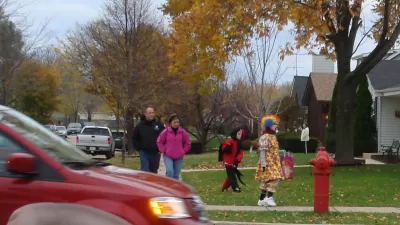The media coverage of a tragic crash in Cleveland shows how long of a leash drivers and street design get in the debate about traffic safety and the public realm.
"In downtown Cleveland Saturday night, a driver high on heroin struck and killed Jenasia Summers, 21, as she rode an electric scooter. But instead of questioning why Cleveland streets are so dangerous, the local press has responded by painting scooters as a safety hazard," writes Angie Schmitt.
Schmitt is criticizing the reporting and social media messaging of Cleveland.com, which, despite reporting in a separate article that the driver of the vehicle was on heroin, also tweeted a question about whether scooters are a cause for concern. An article earlier in the month describes the scooters as "incredibly dangerous," so there's a theme emerging in the publication's approach to electric scooters.
Schmitt is having none of it:
Scooters have been in the local headlines because the city recently told the start-up Bird to remove a fleet of 100 vehicles from public streets. Summers was not riding a Bird — she had rented an Icon scooter from a shop downtown. But whatever vehicle she was riding, it’s less relevant to this crash than Cleveland’s failure to make streets safer for walking, biking, or scooting.
The message echoes the tone of a previous article by Schmitt, which suggests that scooters are far more popular, and boring, than local media suggests. In that article, Schmitt also provides a level of nuance that's been rare in the discussion of electric scooters in that article: "Much of the scary news coverage has no doubt been motivated by fear of change — and, indeed, traveling by e-scooter in cities is a novel idea. In addition, the industry has been dominated by big tech firms who dump their products into public space first and ask for permission second (or not at all)."
FULL STORY: Scooters Aren’t a Public Safety Hazard. Dangerous Streets Designed Only for Cars Are.

Planetizen Federal Action Tracker
A weekly monitor of how Trump’s orders and actions are impacting planners and planning in America.

Restaurant Patios Were a Pandemic Win — Why Were They so Hard to Keep?
Social distancing requirements and changes in travel patterns prompted cities to pilot new uses for street and sidewalk space. Then it got complicated.

Map: Where Senate Republicans Want to Sell Your Public Lands
For public land advocates, the Senate Republicans’ proposal to sell millions of acres of public land in the West is “the biggest fight of their careers.”

Maui's Vacation Rental Debate Turns Ugly
Verbal attacks, misinformation campaigns and fistfights plague a high-stakes debate to convert thousands of vacation rentals into long-term housing.

San Francisco Suspends Traffic Calming Amidst Record Deaths
Citing “a challenging fiscal landscape,” the city will cease the program on the heels of 42 traffic deaths, including 24 pedestrians.

California Homeless Arrests, Citations Spike After Ruling
An investigation reveals that anti-homeless actions increased up to 500% after Grants Pass v. Johnson — even in cities claiming no policy change.
Urban Design for Planners 1: Software Tools
This six-course series explores essential urban design concepts using open source software and equips planners with the tools they need to participate fully in the urban design process.
Planning for Universal Design
Learn the tools for implementing Universal Design in planning regulations.
Heyer Gruel & Associates PA
JM Goldson LLC
Custer County Colorado
City of Camden Redevelopment Agency
City of Astoria
Transportation Research & Education Center (TREC) at Portland State University
Camden Redevelopment Agency
City of Claremont
Municipality of Princeton (NJ)





























